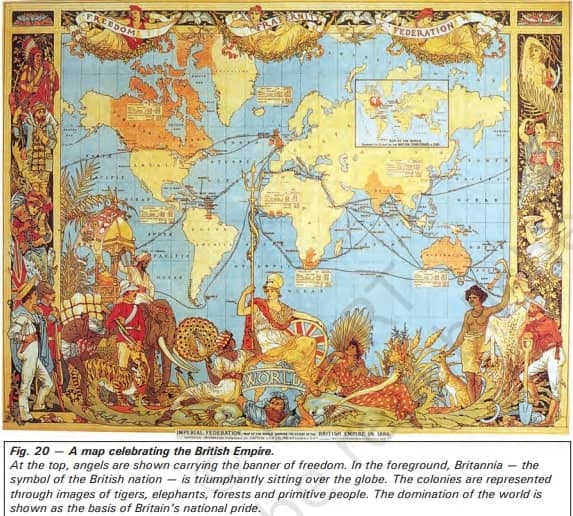Topic & sub-topics covered: Nationalism and Imperialism: The Rise of Nationalism in Europe (All single detail notes that are exam-oriented)
We have discussed in-depth and exam-oriented pointers that can be asked in the board exam of class 10th about “Nationalism and Imperialism” which is taken from the NCERT History book for class 10th and chapter no. 1st “The Rise of Nationalism in Europe”.
Download the PDF of NCERT for Class 10th Social Science History Notes Chapter 1 – The Rise of Nationalism in Europe
We have attached the class 10 history chapter 1 notes pdf “the rise of nationalism in Europe notes pdf” in this blog you can download it from our website for quick revision for your examination.
Nationalism and Imperialism
1. Evolution of Nationalism by the Late 19th Century:
- Nationalism shifted from its idealistic liberal-democratic sentiment of the first half of the century.
- Became a narrow creed with limited ends.
2. Intolerance and Conflict Among Nationalist Groups:
- Nationalist groups became increasingly intolerant of each other.
- Readiness to go to war became a characteristic feature.
3. Manipulation of Nationalist Aspirations by Major Powers:
- Major European powers manipulated the nationalist aspirations of subject peoples for imperialist aims.
- Use of nationalist sentiments by powers for their strategic interests.
4. Balkans: A Key Source of Nationalist Tension:
- Balkans, comprising various Slavic nations, became a major source of nationalist tension after 1871.
- Ottoman Empire’s control, the spread of romantic nationalism, and internal disintegration fueled explosive conditions.
5. Ottoman Empire’s Attempts at Modernization:
- Ottoman Empire attempted modernization and internal reforms throughout the nineteenth century.
- Limited success and European subject nationalities broke away seeking independence.
6. Balkan Struggles for Independence:
- Balkan peoples based claims on nationality, using history to assert their past independence.
- Struggles framed as attempts to regain long-lost independence.
7. Intense Conflicts and Rivalries in the Balkans:
- Balkan states, having gained independence, fiercely competed for territory.
- Big power rivalries (Russia, Germany, England, Austro-Hungary) complicated the situation.
8. Relationship between Nationalism, Imperialism, and World War I:
- Nationalism aligned with imperialism led to the disaster of World War I in 1914.
- Intense power rivalries, trade conflicts, and imperialist ambitions fueled the war.
9. Anti-Imperial Movements and Nationalism:
- Colonized countries opposed European imperial domination.
- Anti-imperial movements were nationalist, aiming for independent nation-states.
10. Diversity in Nationalism Worldwide:
- People developed their specific varieties of nationalism worldwide.
- The idea of organizing societies into ‘nation-states’ became widely accepted.

Summary of Important Topic on “Nationalism and Imperialism“
- Understand the evolution of nationalism by the late 19th century.
- Recognize the intolerance and conflicts among nationalist groups.
- Analyze the manipulation of nationalist aspirations by major powers for imperialist goals.
- Comprehend the complexities and conflicts in the Balkans as a key source of tension.
- Understand the role of nationalism, aligned with imperialism, in triggering World War I.


This sites helped me to clear concepts in easy way . Mind blowing 👍